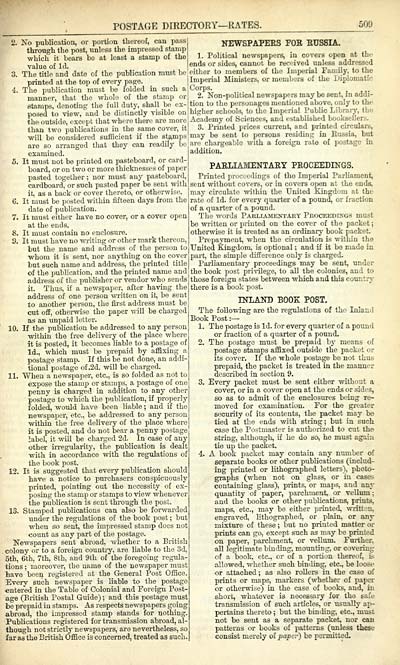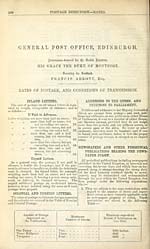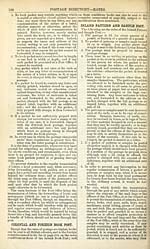Download files
Complete book:
Individual page:
Thumbnail gallery: Grid view | List view

POSTAGE DIRECTORY— RATES.
509
No publication, or portion thereof, can pa.ss
through the post, nnless the impressed stamp
which it bears bo at least a stamp of the
value of Id.
The title and date of the publication must bo
printed at the top of every pap,e. ]
The imblication must be folded in such a
manner, that the whole of the stamp or
stamps, denoting the full duty, shall he. ex-
posed to view, and be distinctly visible on
the outside, except that where there are more
than two publications in the same cover, it
■will be considered sufKcient if the stamps
are so arranged that they can readily be
examined.
It must not be printed on pasteboard, or card-
board, or on two or more thicknesses of paper
pasted together; nor must any pasteboard,
cardboard, or such pasted paper be sent with
it, as a back or cover thereto, or otherwise.
It must be posted within fifteen days from the
date of publication.
It must either have no cover, or a cover open
at the ends.
It must contain no enclosure.
It must have no writing or other mark thereon,
but the name and address of the person to
whom it is sent, nor anything on the coyer
but such name and address, the printed title
of the publication, and the printed name and
NEWSPAPERS FOE RUSSIA.
1. Political newspapers, in covers open at the
ends or sides, cannot be received unless addressed
either to members of the Imperial Family, to the
Imperial Ministers, or members of the Liiplomatic
Corps.
2. Non-political newspapers may be sent, in addi-
tion to the personages mentioned above, only to tli<-
higher schools, to the Imperial Public Library, the
Academy of Sciences, and established booksellers.
3. Printed prices current, and printed circulars,
may be sent to persons residing in llussia, but
are chargealjle v/ith a foreign rate of jjostage in
addition.
PARLIAMENTAEY PROCEEDINGS.
Printed pruCLedings of the Imjierial Parliament,
sent without covers, or in covers ofien at the ends,
may circulate within the United Kingdom at the
rate of Id. for every quai'ter of a pound, or fraction
of a quarter of a pound.
The words Parliajiestary Piioceedixos must
be written or printed on the cover of the packet ;
otherwise it is treated as an ordinaiy book packet.
Prepayment, when the circulation is v,-ithin the
United Kingdom, is optional ; and if it be made in
part, the simple difference only is charged.
Parliamentarj' proceedings may be sent, under
^ the book post privilege, to all the colonies, and to
address of the publisher or vendor who sends those foreign states between which and this countrj-
it. Thus, if a newspaper, after having the ^ ' '' ' ^
address of one person written on it, be sent
to another person, the fii'st address must be
■■ The following are the regulations of the Inland
Book Post : —
1. The postage is Id. for every quarter of a pound
or fraction of a quarter of a pound.
cut off, otherwise the paper will be charged
as an unpaid letter.
10. If the publication be addressed to any person
within the free delivery of the place where
it is posted, it becomes liable to a postage of
Id., which must be prepaid by affixing a
postage stamp. If this be not done, an addi-
tional postage of ,2d. will be charged.
11. "When a newspaper, etc., is so folded as not to
expose the stamp or stamps, a postage of one
penny is charged in addition to any other
postage to which the publication, if properly
folded, would have been liable ; and if the
newspaper, etc., be addressed to any person
within the free delivery of the place where
it is posted, and do not bear a penny postage
label, it wUl be charged 2d. In case of any
other in-egularity, the publication is dealt
with in accordance -^vith the regulations of
the book post.
12. It is suggested that every publication should
have a notice to purchasers conspicuously
printed, pointing out the necessity of ex-
posing the stamp or stamps to view whenever
the publication is sent through the post.
13. Stamped publications can also be forwarded
under the regulations of the book post; but
when so sent, the impressed stamp does not
count as any part of the postage.
Newspapers sent abroad, whether to a British
colony or to a foreign country, are liable to the 3d,
5th, Gth, 7th, 8th, and 9th of the foregoing regula-
tions ; moreover, the name of the newspaper must
have been registered at the General Post Ofnoe.
Everv such newspaper is liable to the postage
entered in the Table of Colonial and Foreign Post-
age (British Postal Guide) ; and this postage must
be prepaid in stamps. As respects newspapers going
abroad, the impressed stamp stands for nothing.
Publications registered for transmission abroad, al-
though not strictly newspapers, are nevertheless, so
far as the British Office is concerned, treated as such.
there is a book post.
INLAND BOOK POST.
The postage must be prepaid by means of
postage stamps affixed outside the packet or
its cover. If the whole postage be not thus
prepaid, the packet is treated in the manner
described in section 9.
Every packet must be sent either without a
cover, or in a cover open at the ends or sides,
so as to admit of the enclosures being re-
moved for examination. For the greater
security of its contents, the packet may be
tied at the ends with string; but in such
case the Postmaster is authorized to cut the
string, although, if he do so, he must again
tie up the packet.
A book packet may contain any number of
separate books or other publications (includ-
ing printed or lithographed letters), photo-
graphs (when not on glass, or iu cases
containing glass), piints, or maps, and any
quantity of paper, parchment, or veUum ;
and the books or other publications, prints,
maps, etc., may be either printed, written,
engraved, lithographed, or plain, or any
mixture of these ; but no printed matter or
prints can go, except such as maj' be printed
on paper, parchment, or vellum. Further,
all legitimate binding, mounting, or covering
of a book, etc., or of a portion thereof, u;
allowed, whether such binding, etc., be loose
or attached ; as also rollers iu the case of
prints or maps, markers (whether of paper
or otherwise) in the case of books, and, in
short, whatever is necessary for the safe
transmission of such articles, or usually ap-
pertains thereto ; but the binding, etc., must
not be sent as a separate packet, nor can
patterns or books of patterns (unless these
consist merely of paper) be permitted.
509
No publication, or portion thereof, can pa.ss
through the post, nnless the impressed stamp
which it bears bo at least a stamp of the
value of Id.
The title and date of the publication must bo
printed at the top of every pap,e. ]
The imblication must be folded in such a
manner, that the whole of the stamp or
stamps, denoting the full duty, shall he. ex-
posed to view, and be distinctly visible on
the outside, except that where there are more
than two publications in the same cover, it
■will be considered sufKcient if the stamps
are so arranged that they can readily be
examined.
It must not be printed on pasteboard, or card-
board, or on two or more thicknesses of paper
pasted together; nor must any pasteboard,
cardboard, or such pasted paper be sent with
it, as a back or cover thereto, or otherwise.
It must be posted within fifteen days from the
date of publication.
It must either have no cover, or a cover open
at the ends.
It must contain no enclosure.
It must have no writing or other mark thereon,
but the name and address of the person to
whom it is sent, nor anything on the coyer
but such name and address, the printed title
of the publication, and the printed name and
NEWSPAPERS FOE RUSSIA.
1. Political newspapers, in covers open at the
ends or sides, cannot be received unless addressed
either to members of the Imperial Family, to the
Imperial Ministers, or members of the Liiplomatic
Corps.
2. Non-political newspapers may be sent, in addi-
tion to the personages mentioned above, only to tli<-
higher schools, to the Imperial Public Library, the
Academy of Sciences, and established booksellers.
3. Printed prices current, and printed circulars,
may be sent to persons residing in llussia, but
are chargealjle v/ith a foreign rate of jjostage in
addition.
PARLIAMENTAEY PROCEEDINGS.
Printed pruCLedings of the Imjierial Parliament,
sent without covers, or in covers ofien at the ends,
may circulate within the United Kingdom at the
rate of Id. for every quai'ter of a pound, or fraction
of a quarter of a pound.
The words Parliajiestary Piioceedixos must
be written or printed on the cover of the packet ;
otherwise it is treated as an ordinaiy book packet.
Prepayment, when the circulation is v,-ithin the
United Kingdom, is optional ; and if it be made in
part, the simple difference only is charged.
Parliamentarj' proceedings may be sent, under
^ the book post privilege, to all the colonies, and to
address of the publisher or vendor who sends those foreign states between which and this countrj-
it. Thus, if a newspaper, after having the ^ ' '' ' ^
address of one person written on it, be sent
to another person, the fii'st address must be
■■ The following are the regulations of the Inland
Book Post : —
1. The postage is Id. for every quarter of a pound
or fraction of a quarter of a pound.
cut off, otherwise the paper will be charged
as an unpaid letter.
10. If the publication be addressed to any person
within the free delivery of the place where
it is posted, it becomes liable to a postage of
Id., which must be prepaid by affixing a
postage stamp. If this be not done, an addi-
tional postage of ,2d. will be charged.
11. "When a newspaper, etc., is so folded as not to
expose the stamp or stamps, a postage of one
penny is charged in addition to any other
postage to which the publication, if properly
folded, would have been liable ; and if the
newspaper, etc., be addressed to any person
within the free delivery of the place where
it is posted, and do not bear a penny postage
label, it wUl be charged 2d. In case of any
other in-egularity, the publication is dealt
with in accordance -^vith the regulations of
the book post.
12. It is suggested that every publication should
have a notice to purchasers conspicuously
printed, pointing out the necessity of ex-
posing the stamp or stamps to view whenever
the publication is sent through the post.
13. Stamped publications can also be forwarded
under the regulations of the book post; but
when so sent, the impressed stamp does not
count as any part of the postage.
Newspapers sent abroad, whether to a British
colony or to a foreign country, are liable to the 3d,
5th, Gth, 7th, 8th, and 9th of the foregoing regula-
tions ; moreover, the name of the newspaper must
have been registered at the General Post Ofnoe.
Everv such newspaper is liable to the postage
entered in the Table of Colonial and Foreign Post-
age (British Postal Guide) ; and this postage must
be prepaid in stamps. As respects newspapers going
abroad, the impressed stamp stands for nothing.
Publications registered for transmission abroad, al-
though not strictly newspapers, are nevertheless, so
far as the British Office is concerned, treated as such.
there is a book post.
INLAND BOOK POST.
The postage must be prepaid by means of
postage stamps affixed outside the packet or
its cover. If the whole postage be not thus
prepaid, the packet is treated in the manner
described in section 9.
Every packet must be sent either without a
cover, or in a cover open at the ends or sides,
so as to admit of the enclosures being re-
moved for examination. For the greater
security of its contents, the packet may be
tied at the ends with string; but in such
case the Postmaster is authorized to cut the
string, although, if he do so, he must again
tie up the packet.
A book packet may contain any number of
separate books or other publications (includ-
ing printed or lithographed letters), photo-
graphs (when not on glass, or iu cases
containing glass), piints, or maps, and any
quantity of paper, parchment, or veUum ;
and the books or other publications, prints,
maps, etc., may be either printed, written,
engraved, lithographed, or plain, or any
mixture of these ; but no printed matter or
prints can go, except such as maj' be printed
on paper, parchment, or vellum. Further,
all legitimate binding, mounting, or covering
of a book, etc., or of a portion thereof, u;
allowed, whether such binding, etc., be loose
or attached ; as also rollers iu the case of
prints or maps, markers (whether of paper
or otherwise) in the case of books, and, in
short, whatever is necessary for the safe
transmission of such articles, or usually ap-
pertains thereto ; but the binding, etc., must
not be sent as a separate packet, nor can
patterns or books of patterns (unless these
consist merely of paper) be permitted.
Set display mode to: Large image | Transcription
Images and transcriptions on this page, including medium image downloads, may be used under the Creative Commons Attribution 4.0 International Licence unless otherwise stated. ![]()
| Scottish Post Office Directories > Towns > Edinburgh > Post Office Edinburgh and Leith directory > 1867-1868 > (515) |
|---|
| Permanent URL | https://digital.nls.uk/83592707 |
|---|
| Description | Directories of individual Scottish towns and their suburbs. |
|---|
| Description | Around 700 Scottish directories published annually by the Post Office or private publishers between 1773 and 1911. Most of Scotland covered, with a focus on Edinburgh, Glasgow, Dundee and Aberdeen. Most volumes include a general directory (A-Z by surname), street directory (A-Z by street) and trade directory (A-Z by trade). |
|---|


